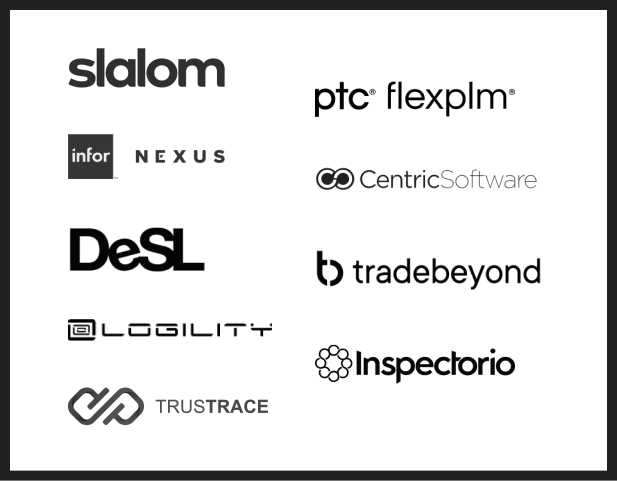

Changing the world of consumer goods
Worldly helps businesses succeed in an era of new expectations.


Worldly helps businesses succeed in an era of new expectations.

We believe that the businesses driving change today will be the ones leading markets tomorrow. But to truly know—and improve—their impact, both brands and manufacturers need a new kind of intelligence.
That’s why we developed Worldly.
Worldly equips future-forward brands and manufacturers with powerful supply chain intelligence as the basis for taking action. Actions that ultimately transform how products are made, marketed, bought, used, and recycled.
Relied on by more than forty thousand brands and manufacturers across the globe, Worldly proudly hosts and supports leading sustainability assessments and methodologies for the apparel, textile, and footwear industry.
Below, read our 2022 impact report to learn how our customers are improving their impact with Worldly.
Worldly was launched in 2019 as a public-benefit technology company, led by a founding team with decades of experience in apparel manufacturing, sustainable innovation, and software development.
Initially the platform was designed to host the Higg Index, a suite of measurement tools developed by the global nonprofit alliance Cascale (formerly the Sustainable Apparel Coalition). This methodology is the most widely used within the apparel and footwear industries, and Worldly remains its exclusive licensee.
In recent years, we’ve expanded the capabilities of Worldly with more advanced analytics, reporting, and performance tracking tools — as well as complementary data and methodologies from trusted third-parties. We’re proud to serve customers in hard goods, outdoor equipment, home furnishings, and toys in addition to apparel.


Scott Raskin is the CEO of Worldly, where he champions the idea that impactful change springs from actionable measures. Leveraging years of leadership experience in tech companies, he steers Worldly toward sustainable growth, providing brands, manufacturers, retailers, and suppliers with solutions to enhance their positive environmental and social impact.
Scott's commitment to results and customer satisfaction positions Worldly as an essential platform for consumer goods companies seeking to lessen their footprint, adhere to regulations, and promote transparency. His management style, deeply rooted in valuing people and culture, inspires creativity and teamwork. Guided by a firm resolve to create significant change, Scott's leadership shapes Worldly's contribution to a more responsible corporate world.
Scott is focused on leading the evolution and expansion of Worldly’s platform to include new capabilities, innovations, and automation to empower sustainability-minded companies to analyze, understand, report, and improve their supply chain and product impacts.

Francois Thrower is the Chief Financial Officer at Worldly, where his extensive experience in financial management and strategic leadership play a pivotal role in driving Worldly’s growth trajectory. In his role as CFO, Francois oversees Worldly's financial operations, guiding financial strategy, capital management, and financial reporting.
With a career spanning over two decades, Francois has held pivotal financial leadership positions in numerous SaaS companies. His expertise in honing and transforming financial strategies, along with his forward-thinking approach, complements Worldly's dynamic team as we continue to broaden our customer base and refine our product line-up to better serve them.
Francois Thrower holds a Bachelor of Science in Economics from The Wharton School, with a finance concentration.

Jason Kibbey is the President and Founder of Worldly, a technology platform that helps consumer goods companies measure and improve the sustainability of their value chain. Jason has had a successful career as an entrepreneur and leader in the environmental and social impact sectors. He was the founding CEO of the global nonprofit alliance Cascale (formerly the Sustainable Apparel Coalition) where he and his team worked to reduce the environmental and social impacts of the global apparel and footwear sector. Under Jason’s leadership, the Higg Index was created and launched, providing a scalable and unified framework for consistency and comparability in industry-level sustainability measurement.
Jason started his career at Bain & Company, where he worked on turnaround and product strategies for technology companies. He then moved to Patagonia, where he worked on environmental campaigns and later served as co-founder and interim Executive Director of Freedom to Roam, a non-profit initiative that brings together people, organizations, and businesses to enhance and protect wildlife corridors and landscape connectivity in North America. Prior to Cascale, Jason co-founded PACT Apparel, combining design, sustainability, and philanthropy.
Jason graduated from the University of California (UC) Berkeley with a BS in Environmental Economics and Policy and BA in Religious Studies, and received his MBA from UC Berkeley’s Haas School of Business.

John Armstrong is the Chief Technology Officer at Worldly, where he is responsible for the development and strategic roadmap of Worldly technology.
John has deep experience conceptualizing, architecting, launching, and scaling products for a wide variety of organizations including start-ups, nonprofits and publicly traded corporations.
Prior to Worldly, he co-founded the development firm Bright & Shiny, where he put his expertise to use solving a variety of complex technical asks for clients of all sizes.
As the Technology Director for Frog Design, he worked with some of the world’s leading companies, helping them build a wide range of meaningful products, services and experiences, depending on their individual need.
John has always relied on a common-sense approach to software design and construction rather than rigid conformance to any specific methodology or technology. He’s happy to apply his diverse skill set to Worldly, where agile tech is the potent vehicle that can power massive global change.
John studied Computer Science at the University of California, Santa Barbara. He enjoys mountain biking in the hills of southern California any chance he can get.

James Schaffer is the Chief Strategy Officer of Worldly, where he oversees business development, client services, partnerships, and corporate development.
Before joining Worldly, James was co-founder and Managing Partner of Schaffer & Combs, a strategy consultancy that served purpose-driven organizations globally since 2009. During his tenure, James led numerous strategy engagements with leading sustainability organizations, including the Sustainable Apparel Coalition, Apparel Impact Institute, ZDHC, BlueSign, World Resources Institute, B Lab, Rainforest Alliance, and Outdoor Industry Association, as well as with dozens of social sector organizations. In recent years, James has spearheaded negotiations that established the industry alliance between the Sustainable Apparel Coalition, Textile Exchange, the Apparel Impact Institute, and ZDHC to drive efficiencies and accelerate sustainability efforts within the apparel industry. He also played a critical role in establishing Worldly as a standalone technology company.
Before Schaffer & Combs, James was CEO of Global Data Vault Corporation, a data storage technology company serving customers in the U.S. and U.K.
James’s career synthesizes business leadership and growth through innovation and partnerships, and a profound commitment to social impact and environmental sustainability.
He graduated from The College of William and Mary with a BA in Government.

Stephanie Bastin-Wells leads the People Organization at Worldly and is responsible for supporting their global employee base.
Prior to Worldly, Stephanie built an international career across various industries implementing human resource strategies to support and engage global talent. She thrives in the startup space due to her unique combination of business acumen and HR expertise and is known for generating compassionate approaches to complex situations. Stephanie believes that leadership authenticity is the key to engaging and inspiring talent and she encourages leaders to be the best versions of themselves at work and beyond.
Outside of work, Stephanie advocates for global understanding by hosting high school students from around the world. She is a curious and enthusiastic international traveler, an average-but-passionate skier, an avid reader, a coffee lover and she enjoys spending time outdoors doing anything with her family and dopey Labrador.
Stephanie has held active SPHR and SHRM-SCP accreditations for 15 years and is an honors graduate from Portland State University in Oregon.
Worldly is proud to be funded by values-aligned investors that support our mission to improve supply chain sustainability—across not only carbon but water, energy, and worker well-being.
Our Series B was co-led by technology growth investor Silversmith Capital Partners and Tom Steyer and Katie Hall’s Galvanize Climate Solutions, along with participation by Series A partners Titan Grove and Buckhill Capital. This funding will accelerate our delivery of innovative technology solutions and rapid expansion into new consumer goods categories.
These investors share our vision of creating the economy of the future: one that prioritizes people and planet, without compromising growth.





From enterprise technologies to NGO’s, our diverse partner ecosystem helps Worldly customers innovate and drive progress faster.

We’re on a mission to change the way consumer goods are made.
© 2024 Worldly. All Rights Reserved